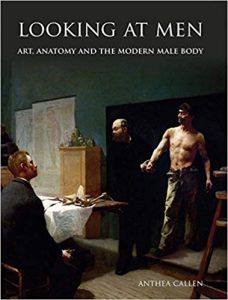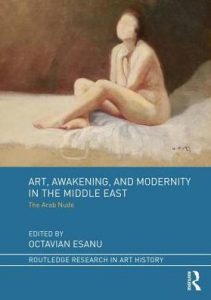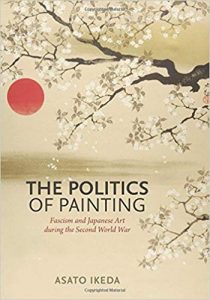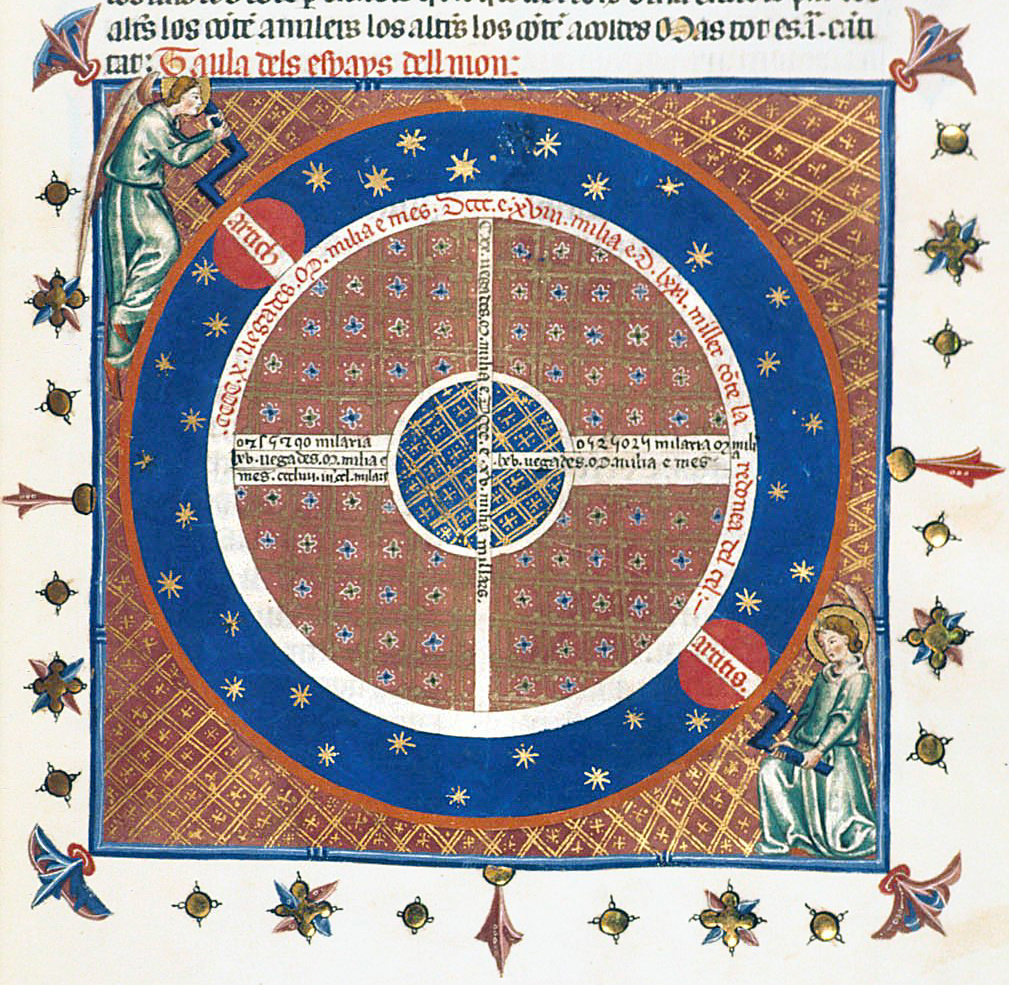CAA News Today
Sign Up for Childcare at the 2020 Annual Conference
posted by CAA — October 16, 2019

Please note: Due to low enrollment, onsite childcare for the 2020 Annual Conference has been canceled. To better meet members’ childcare needs, we are now offering Childcare Grants of up to $250 per family. Learn more and apply here.
For the second year in a row, we’re pleased to partner with Kiddie Corp to offer onsite childcare at the Annual Conference.
Care will be available for ages 6 months to 12 years of age, at a rate of $12 an hour, on Thursday, February 12 and Friday, February 13, 2020, from 8 AM – 8 PM.
Kiddie Corp programs feature arts and crafts, group games, music and movement, board games, story time, dramatic play, and many more engaging activities. Kiddie Corp is in its 33rd year of providing childcare services at conferences and trade shows and has a longstanding partnership with the American Academy of Pediatrics.
Conference attendees in need of childcare during the conference should pre-register for care. A minimum number of children must register for the service by December 3rd in order to allow CAA to offer onsite childcare in the Hilton Chicago. Please note: If we do not have enough enrollment, onsite childcare will be canceled.
Sign up deadline: December 3, 2019
News from the Art and Academic Worlds
posted by CAA — October 16, 2019
A Team of Curators Designs a System for Indigenous Artists to Thrive In
The term ‘decolonization’ has been used frequently to describe the exhibition yəhaw̓. But you won’t hear its curators call it a decolonial project. (Hyperallergic)
This App Can Tell You the Indigenous History of the Land You Live On
Part of a growing movement to honor native land, this app provides a resource for teaching and acknowledgement at public events. (Native Land)
International Review: Community-Led Engagement with Contemporary Craft, Design, and Architecture in Aotearoa
In the late 1990s, a group of craft practitioners spearheaded an initiative to develop the Objectspace gallery for Aotearoa (the Māori name for New Zealand). (CAA News)
This Library Takes an Indigenous Approach to Categorizing Books
Xwi7xwa library in British Columbia is decolonizing the way information is sorted, cataloged, and shared. (Yes Magazine)
Decolonizing and Diversifying Are Two Different Things: A Workshop Case Study
A helpful explainer focused on decolonial pedagogical tools, adapted from a CAA 2019 workshop. (AHTR)
Want articles like these in your inbox? Sign up:
CWA Picks for October 2019
posted by CAA — October 15, 2019
CAA’s Committee on Women in the Arts selects the best in feminist art and scholarship to share with CAA members on a monthly basis. See the picks for October below.
JUDY CHICAGO: THE END: A MEDITATION ON DEATH AND EXTINCTION
National Museum of Women in the Arts
September 19, 2019 – January 20, 2020
Judy Chicago (a feminist artist renowned for the 1970s mixed media installation, The Dinner Party), takes on her own demise in this exhibition, which includes 40 works of painted porcelain and glass and two large bronze sculptures in her hallmark bold, graphic style. Other themes captured in this exhibit are the five stages of grief and species endangered by the action or inaction of humans. Chicago’s ever-present feminist content challenges the culture that prizes youth and beauty, often over the suffering of other creatures. The Price of Love (after Kollwitz) (kiln-fired glass paint on black glass, 2015) shows two figures in a tight kneeling embrace, hands covering their faces, with the script: “Grief / DESOLATION / Sorrow / LOSS” all painted with white on black, evoking the depth of sorrow. The imagery remarkably reflecting the style of Käthe Kollwitz’s prints depicting the sorrows of those left behind after World War I, notably in people tightly embracing. This tribute by Chicago to an artist who came before her exudes the layers of meanings in her work and refreshingly acknowledges the myth of the individual artist. Beyond content, her continued commitment to feminism is also echoed through her choice of media historically associated with women’s artistic endeavors, thus exposing the socially constructed ideals of high versus decorative art, as famously done in The Dinner Party.
CALL FOR WORK: UNDEFEATED: CANVAS(S)ING THE POLITICS OF VOTER SUPPRESSION
West Virginia University Libraries
Deadline: December 31, 2019
West Virginia University takes on a contentious topic on the occasion of the 100th anniversary of the ratification of the 19th amendment to the US Constitution (granting women the right to vote), and the 55th anniversary of the Voting Rights Act of 1965 (enforcing voting rights for racial minorities) by looking at the efforts to suppress the votes of women and minorities since 1920. The WVU Libraries are calling for artwork using the template of a round button design (digital or otherwise; the Library has round canvases to disperse should artists need) around the major themes: Information/Disinformation, Access/Intimidation, Legislation/Legal Questions, Voter Fraud, and Advocacy/Action. Selected works will be on display at the University’s main campus Library from August 2020 through June 2021, and selected designs from the exhibit will be made into buttons/stickers. Located in Morgantown, artists have a great opportunity to make an impact in a local hub of arts activity in an otherwise underserved region of Appalachia.
MARINA ABRAMOVIĆ
THE CLEANER
Museum of Contemporary Art, Belgrade, Serbia
September 21, 2019 – January 20, 2020
This is the first major European retrospective of Marina Abramović, a female artist renowned for her radical performances developed since 1970s. The location of the exhibition, the final on its tour (it was first shown in 2017 at the Moderna Museet (Stockholm, Sweden), and then traveled to the Louisiana Museum of Modern Art (Humlebæk, Denmark), Henie Onstad Kunstsenter (Oslo, Norway), Bundeskunsthalle (Bonn, Germany), Fondazione Palazzo Strozzi (Florence, Italy) and the Centre of Contemporary Art ‘Znaki Czasu’ (Toruń, Poland)) is significant, as Belgrade is Abramović’s place of birth. It is also where her artistic career began.
The artist has experimented with performance art and used her body as a method and a medium, relentlessly testing its boundaries and limits and challenging social and cultural stereotypes. The exhibition reviews Abramović’s over fifty-year long career, focusing on chronological phases in her artistic practice and emphasizing her solo career from 1991 until 2017. It is a rich display of over 120 works including a range of objects, photographs, paintings, drawings, video installations, films, and archival materials. There is also a live segment presented through re-performances by local and international performers.
MONA HATOUM
REMAINS TO BE SEEN
White Cube Bermondsey, London
September 12 – November 3, 2019
White Cube’s exhibition captures Mona Hatoum’s new and recent installation, sculpture and work on paper. Hatoum, a Palestinian multimedia and installation artist, throughout her career has created a rich aesthetic vocabulary that often references the grid and geometry as references to systems of social control. In the exhibition the artist reflects on surveillance systems and mobilizes issues concerned with mobility, conflict, and power. Once again working with the grid, Hatoum uses industrial materials such as steel, brick, concrete, rubble, and glass—but also human hair—and collapses them into light, a suspended cube. Her visual poetics tests spatial and spherical limits and explores possibilities for formal but perhaps also social and political collapse. The theme of the grid and its negotiation overarches the works presented at the exhibition, the new installation Remains to be Seen (2019), Orbital I (2018), A Pile of Bricks (2019), Hair Mesh (2013), or Cells (2014), among others. Hatoum tests different confinements while exploring the basic form of the globe and questions the different and multiple boundaries that are imposed on society.
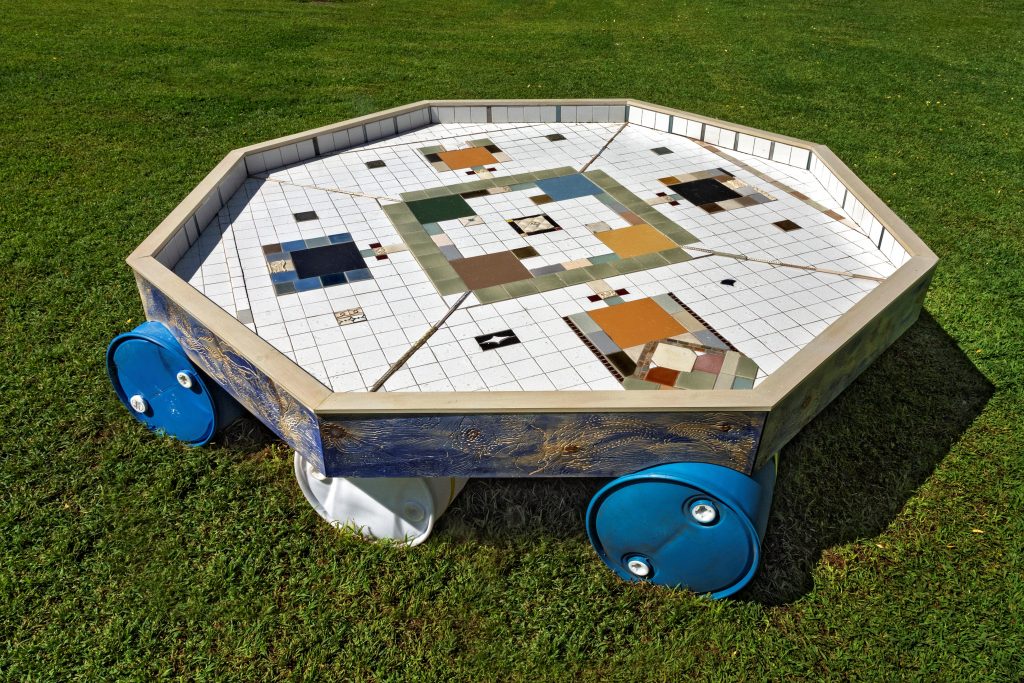
Bahar Behbahani, All water has a perfect memory. (Octagon), 2019, hard-carved pinewood panels, Lapis Lazuli pigment, mosaic, tile, plastic barrel, lashing strap, sandbag, 12 x 12 x 3 feet, Wave Hill, Bronx, NY. On view at Wave Hill through December 1st. Photo: Stefan Hagan
Bahar Behbahani, All water has a perfect memory.
Wave Hill, Bronx, New York
September 15 – December 1, 2019
Bahar Behbahani’s (b. 1973, Tehran, Iran) site-specific installation titled All water has a perfect memory. [the period is intentional] is settled somewhat precariously along the eight-acre wooded expanse at Wave Hill, the Bronx public garden and cultural center known for supporting dynamic contemporary art projects and exhibitions. The installation’s primary feature is the large presence of a land-bound raft constructed in the shape of an octagon, ornamented with inlaid mosaic and tile, and supported on plastic barrels. Behbahani’s structure fosters multiple discussions about the garden’s surrounding woodlands and ecosystems and engages in prescient ecological debates. At the same time, the artist’s centerpiece addresses the historical flux of migration and the restriction of geographical borders. The title aptly recalls a poetic line from writer Toni Morrison’s essay, “The Site of Memory”: “All water has a perfect memory and is forever trying to get back to where it was.” In her research-based practice, Behbahani heavily layers and builds upon her cultural and aesthetic references, and water plays a central biographical and performative role in her videos and paintings. Likewise, water functions as a primary visual and spiritual element in the Persian Gardens of Iran, the majestic walled paradises and civilian sanctuaries dating back to the sixth-century BC. Water was a foremost compositional cornerstone of these historic gardens that were organized on a fourfold plan around central pools or fountains from which flowed four channels. At Wave Hill, the manifestation of the octagonal pool, raft or “fountain,” accessorized with botanical panel designs, forges further connections to eight of the world’s contested rivers: the Euphrates, Ganges, Hudson, Karun, Mississippi, Rio Grande, and Wouri. Moreover, the octagon appears as both a sheltering and perilous object. As a stationary structure, it conjures the urgent political narratives on mobility and circulation that underline the fraught experiences of migrants and refugees. In the accompanying pamphlet, the artist explained these multifold references, stating that “the project made her think about the ‘complexity’ of building a ‘worthy raft,’ one that would be able to ‘move people, food, belongings as well as culture and memories to safety…” The project also questions broader horticultural concerns about what determines “native” flora and species. Additional technological components activate river sounds, a meditative element arranged by musician Maciek Schejbal. In the near future, the octagon will hopefully find a way to reach water, holding with it a bounty of new and old memories.
Marking Indigenous Peoples’ Day with Art Journal
posted by CAA — October 14, 2019
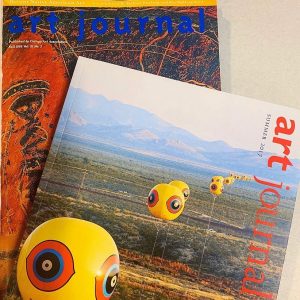
In celebration of Indigenous Peoples’ Day we have brought out from behind the paywall two issues of Art Journal in their entirety: our Summer 2017 issue on Indigenous Futures, (featuring Postcommodity’s Repellent Fence on the cover) and our Fall 1992 issue on Recent Native American Art. Articles from each will be open access until the end of October.
Shana Kaplow and Kenneth Steinbach
posted by CAA — October 14, 2019
The weekly CAA Conversations Podcast continues the vibrant discussions initiated at our Annual Conference. Listen in each week as educators explore arts and pedagogy, tackling everything from the day-to-day grind to the big, universal questions of the field.
CAA podcasts are on iTunes. Click here to subscribe.
This week, Shana Kaplow and Kenneth Steinbach discuss creative process research.
Shana Kaplow is a Twin Cities artist and professor in the Art Department at St. Cloud State University, Minnesota.
Kenneth Steinbach is an artist, writer, and Professor of Art at Bethel University in Minneapolis, Minnesota.
New in caa.reviews
posted by CAA — October 11, 2019
Emmelyn Butterfield-Rosen writes about Looking at Men: Art, Anatomy and the Modern Male Body by Anthea Callen. Read the full review at caa.reviews.
Dina Ramadan reviews Art, Awakening, and Modernity in the Middle East: The Arab Nude, edited by Octavian Esanu. Read the full review at caa.reviews.
Hannah Slater covers Asato Ikeda’s book The Politics of Painting: Fascism and Japanese Art during the Second World War. Read the full review at caa.reviews.
Explore the 2018 Dissertation List
posted by CAA — October 10, 2019
Once a year, each institution granting the PhD in art history and/or visual studies submits dissertation titles to CAA for publication. caa.reviews has now published the authors and titles of doctoral dissertations in art history and visual studies—both completed and in progress—from American and Canadian institutions for calendar year 2018.
You can browse by listing date or by subject matter. Each entry identifies the student’s name, dissertation title, school, and advisor. Click here to explore.
News from the Art and Academic Worlds
posted by CAA — October 09, 2019
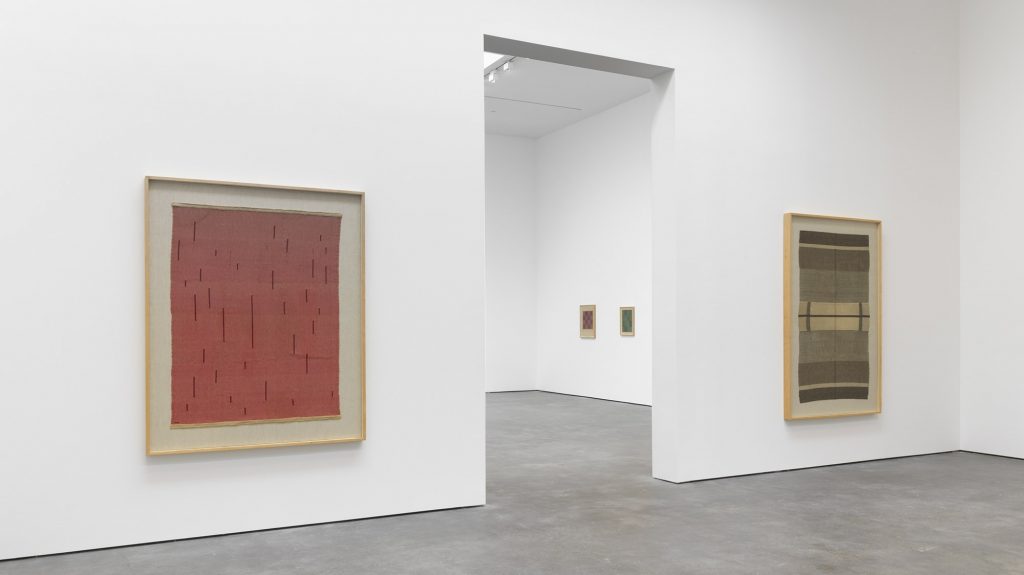
Anni Albers’s work is the subject of a new exhibition at David Zwirner in New York. Image: David Zwirner, via Vanity Fair
Listening to Threads With Anni Albers
“Circumstances held me to threads and they won me over,” Anni Albers said on a 1982 College Art Association panel. “I learned to listen to them and to speak their language. I learned the process of handling them.” (Vanity Fair)
Art Classes Instead of Court Dates? In Low-Level Cases, Brooklyn DA Says Yes
People arrested on low-level misdemeanors in Brooklyn will now have the option to complete a one-day arts course at the Brooklyn Museum. (Brooklyn Eagle)
New Scrutiny of Museum Boards Takes Aim at World of Wealth and Status
For board members not invited because of artistic or academic accomplishments, the price of entry remains steep. (New York Times)
What the Hell Was Modernism?
“Much of modernism and its concerns now feel long ago, forged in a time of rapid industrial change when white European males assumed they ruled the world. The demands of our times call for something else.” Jerry Saltz considers the new MoMA. (New York Magazine)
Want articles like these in your inbox? Sign up:
Announcing the 2020 CAA-Getty International Program Participants
posted by CAA — October 07, 2019
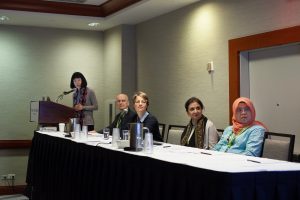
CAA-Getty International Program Participating Alumni (left to right) Chen Liu, Nazar Kozak, Katarzyna Cytlak, Nadhra Khan, and Sarena Abdullah at the 2019 Annual Conference in New York. Photo: Ben Fractenberg
We’re pleased to announce this year’s participants in the CAA-Getty International Program. Now in its ninth year, this international program supported by the Getty Foundation will bring fifteen new participants and five alumni to the 2020 Annual Conference in Chicago, Illinois.
The participants—professors of art history, curators, and artists who teach art history—hail from countries throughout the world, expanding CAA’s growing international membership and contributing to an increasingly diverse community of scholars and ideas. This year we are adding participants from four countries not included previously—Bolivia, Saudi Arabia, Côte d’Ivoire, and Singapore—bringing the total number of countries represented by the program to fifty. Selected by a jury of CAA members from a highly competitive group of applicants, the participants will receive funding for travel expenses, hotel accommodations, conference registration, CAA membership, and per diems for out-of-pocket expenditures.
At a one-day preconference colloquium, to be held this year at the School of the Art Institute of Chicago, the fifteen new participants will discuss key issues in the international study of art history together with five CAA-Getty alumni and several CAA members from the United States, who also will serve as hosts throughout the conference. The preconference program will delve deeper into subjects discussed during last year’s program, including such topics as postcolonial and Eurocentric legacies, interdisciplinary and transnational methodologies, and the intersection of politics and art history.
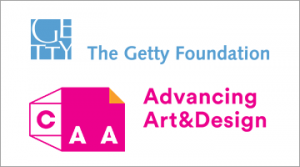
This is the third year that the program includes five alumni, who provide an intellectual link between previous convenings of the international program and this year’s events. They also serve as liaisons between CAA and the growing community of CAA-Getty alumni. In addition to serving as moderators for the preconference colloquium, the five alumni will present a new Global Conversation during the 2020 conference titled Things Aren’t Always as they Seem: Art History and the Politics of Vision.
The goal of the CAA-Getty International Program is to increase international participation in the organization’s activities, thereby expanding international networks and the exchange of ideas both during and after the conference. CAA currently includes members from sixty countries around the world. We look forward to welcoming the following participants at the next Annual Conference in Chicago.
2020 Participants in the CAA-Getty International Program
Irene Bronner, Senior Lecturer, NRF South African Research Chair in South African Art and Visual Culture, University of Johannesburg, South Africa
Eiman Elgibreen, Assistant Professor of Art History, The Princess Nourah bint Abdulrahman University, Riyadh, Saudi Arabia
Daria Jaremtchuk, Associate Professor of Art History, University of São Paulo, Brazil
Ganiyu Jimoh, Lecturer, University of Lagos, Nigeria, and Postdoctoral Fellow, Arts of Africa and Global Souths research program, Department of Fine Art, Rhodes University, South Africa
Mariana Levytska, Research Associate, Department of Art Studies, Ethnology Institute, UNAS (National Academy of Sciences of Ukraine)
Daniela Lucena, Head of Research Team, National Scientific and Technical Research Council (CONICET), University of Buenos Aires, Argentina
Ali Mahfouz, Director, Mansoura Storage Museum, Ministry of Egyptian Antiquities, Egypt
Priya Maholay-Jaradi, Convenor, Art History, National University of Singapore
Valeria Maria Paz Moscoso, Academic Coordinator and Advisor, Universidad Catolica Boliviana San Pablo, La Paz, Bolivia
Daria Panaiotti, Curator of Photography and Research Associate, The State Hermitage Museum, St. Petersburg, Russia
Aleksandra Paradowska, Assistant Professor, University of Fine Arts, Poznań, Poland
Saurabh Tewari, Assistant Professor, School of Planning and Architecture, Bhopal, India
Giuliana Vidarte, Chief Curator and Head of Exhibitions, Museum of Contemporary Art of Lima and Peruvian University of Applied Sciences, Peru
Julia Waite, Curator of New Zealand Art, Auckland Art Gallery Toi o Tāmaki, New Zealand
Jean-Arsène Yao, University Félix Houphouët-Boigny, Côte d’Ivoire
Participating Alumni
Abiodun Akande, Senior Lecturer, University of Lagos, Nigeria
Pedith Chan, Assistant Professor of Cultural Management, Chinese University of Hong Kong
Iro Katsaridou, Curator of Modern and Contemporary Art, Museum of Byzantine Culture, Thessaloniki, Greece
Cristian Emil Nae, Associate Professor, George Enescu National University of Arts, Iasi, Romania
Nora Veszpremi, Research Associate, Continuity/Rupture: Art and Architecture in Central Europe 1918–1939 (CRAACE), Masaryk University in Brno, Czech Republic
Carlos Rene Pacheco and Anh-Thuy Nguyen
posted by CAA — October 07, 2019
The weekly CAA Conversations Podcast continues the vibrant discussions initiated at our Annual Conference. Listen in each week as educators explore arts and pedagogy, tackling everything from the day-to-day grind to the big, universal questions of the field.
CAA podcasts are on iTunes. Click here to subscribe.
This week, Carlos Rene Pacheco and Anh-Thuy Nguyen discuss preparing MFA graduates to be educators/faculty members.
Carlos Rene Pacheco is a photographer and new media artist and he currently resides in Fargo, North Dakota where he has taught courses in Photography, Contemporary Art Theory, and Professional Practices in the Arts as an Assistant Professor of Art at Minnesota State University Moorhead.
Anh-Thuy Nguyen is a Tucson-based multi-media/transdisciplinary artist, whose work spans from photography, video, and installation to performance art, and she is the head of the photography program at Pima Community College, Tucson, Arizona.




